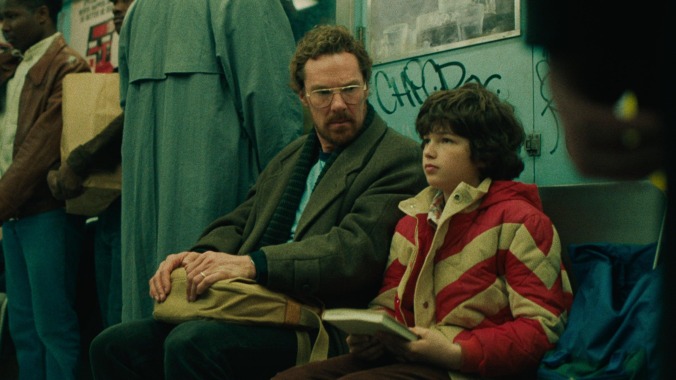Eric review: Benedict Cumberbatch leads a weird, absorbing thriller
The actor ably tackles a grumpy puppeteer in Netflix's limited series

“Eric is that which we fear” is how Eric sums up its titular life-size puppet. He exists in Vincent Anderson’s (Benedict Cumberbatch) imagination, manifesting as his worst anxieties. The fuzzy blue creature’s presence is a sign of Vincent’s declining mental health, which reaches a breaking point when his young son goes missing. Netflix’s miniseries, which premieres May 30, uses this tragedy to unpack myriad personal, familial, and societal issues. It doesn’t do a great job navigating all its complexities equally, but Eric is weirdly compelling anyway thanks to its lead star.
Cumberbatch plays a grumpy and wry puppeteer who has screwed up every aspect of his life. Seriously, Vincent is disliked by everyone he meets because his ego is the size of the sun. The actor is no stranger to such extreme characters (Sherlock, The Power Of The Dog), so Eric is another outlet for him to swim in these waters. And to his credit, Cumberbatch delivers an affecting performance as Vincent battles inner demons, dismantles the self-conceit, and processes a range of feelings. He’s the show’s heart all the way through its (pretty muddled) end.
But first, let’s start to the beginning. A revered puppeteer, Vincent has pissed off everyone at his workplace, a Muppets-esque kids’ TV show called Good Day Sunshine. Meanwhile, his marriage with Cassie (Gaby Hoffmann) is in shambles. Their frequent loud arguments impact their nine-year-old, Edgar (Ivan Howe), who struggles to bond with his dad. He tries to do so by drawing a figure he hopes Vincent brings to life in the office. Edgar names his creation—you guessed it—Eric. So when the child vanishes one morning on his way to school, Vincent convinces himself this puppet his son sketched will somehow bring him back.
It kicks off a whimsical, emotional, and suspenseful saga for Vincent. He fancies himself a lone wolf because no one believes his theories about Edgar. He continually gets drunk and pushes everyone away, though, so his only companion lives entirely in his head. Eric (his subconscious) shadows Vincent through the streets and tunnels of Manhattan, gnawing at him about his ignorance and callousness. Why didn’t Vincent drop Edgar off as planned? Why did he reprimand his son so often? The bizarre visuals of Cumberbatch facing off, dancing, or chatting with a toothy stooge are reminiscent of Showtime’s Happy, starring Chris Meloni. Here, too, an eccentric situation sets the stage for a meditative story about remorse and intergenerational trauma.
Eric dwells on Vincent’s poor relationship with his own wealthy parents and how the cycle inevitably continues with Edgar. The six hourlong episodes are potent when they focus on this shitty dynamic. Similarly, it’s moving to see Cassie grapple with a parental nightmare. Reeling from Edgar’s disappearance, she also tries to take matters into her own hands. Hoffmann’s performance is equally haunting as she sits with her character’s pain and helplessness.
The other major piece of this puzzle is NYPD Detective Michael Ledroit (McKinley Belcher III), one of the only cops dedicated to finding Edgar and another missing child, a Black teen not getting similar media or police attention. Through him, series creator Abi Morgan scrutinizes larger issues related to homophobia, homelessness, and political corruption in 1980s New York City. Eric taps into its very specific setting with excellent production and set design, and the show’s grimy alleys and darkened subway underpasses form a cutting contrast to the vibrancy of Good Day Sunshine and Eric’s whole deal.
However, by juggling these topics, Eric shifts from a gritty psychological thriller into a predictable mystery about morality at the expense of building Michael up as a secondary protagonist. He’s got problems of his own, including the loss of a loved one and barely any support at work. Despite these similar circumstances, he is Vincent’s opposite, and their approaches are vastly different. This duality makes for an absorbing character study, and Belcher III’s gentle expressiveness is a great parallel to Cumberbatch. Unfortunately, the last couple of episodes opt for a timely but generic tale.
Eric doesn’t sustain its momentum but it still boasts sufficient tension, heightened emotions, and some great performances. There’s a chance it’ll get lost in the current TV landscape. (Netflix’s onslaught of content doesn’t help, nor does the steady stream of true-crime shows, thrillers, and atmospheric dramas that seem to fly under the radar.) So while Eric isn’t perfect, its melancholy, sense of place, and general weirdness make it definitely worth your while.
Eric premieres May 30 on Netflix